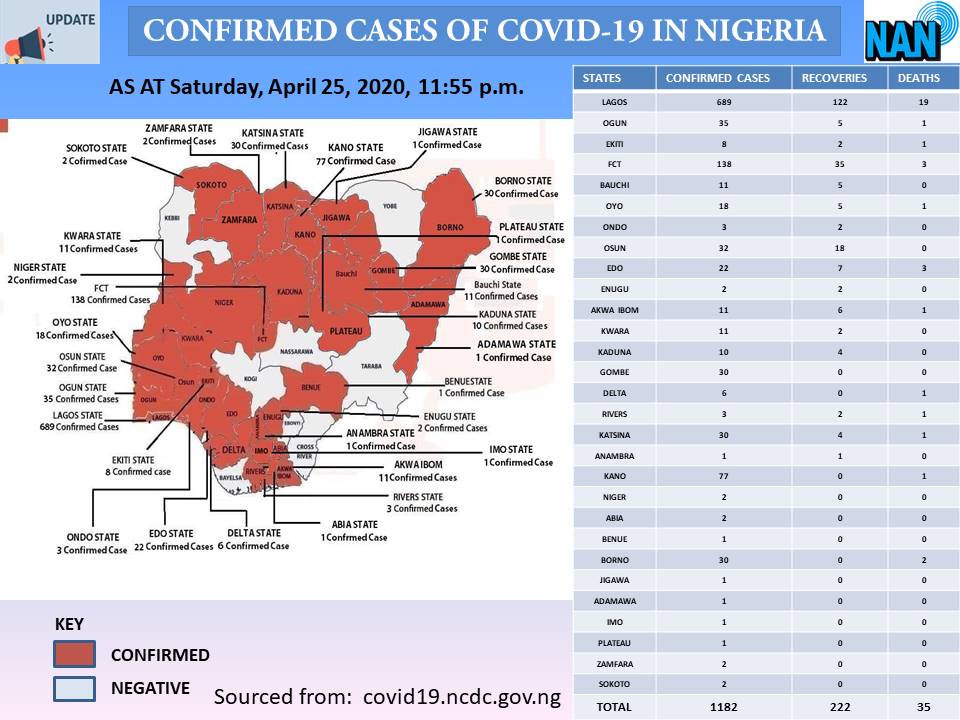By Ebuka Onyeji
As the death toll from COVID-19 complications nears the thousand mark in Nigeria, health experts and civil organisations have raised concerns over the care of senior citizens who are disproportionately affected by the disease.
On Saturday, fatalities from COVID-19 in the country reached 997 as the total number of infections climbed above 51,000.
Authorities had issued repeated warnings to citizens to take preventive measures against the virus.
Health experts, however, believe there is a need for the care of elderly people to be accorded priority.
Even though the most affected age group in Nigeria is between 31 to 40, about 70 per cent of fatalities were persons over 60 years of age, according to data from Nigeria’s infectious disease control outfit, NCDC.
“A finding from the analysis of the death pattern shows… about 70 per cent of fatalities were persons over 60 years old while majority of positives were persons between the ages of 29 and 49,” Osagie Ehanire, the health minister said last month at the daily briefing of the Presidential Task Force (PTF) on COVID-19.
“Among the 70 per cent, some had hypertension or diabetes and the rest were having kidney disease, HIV, cancer, tuberculosis and other challenges,” he said.
‘Why Care for elderly people should be prioritised’
“The reason why elderly people are more susceptible to the disease is that their immune system is less effective at fighting infections as they get older,” said Mercy Adesanya, a public health expert during a paper presentation at a roundtable discussion organised by a pressure group, ‘Oga Ndi Oga’ foundation and held in Abuja on Friday.
The event was held to find ways to better protect elderly people amid the coronavirus pandemic.
Mrs Adesanya, a professor, spoke on the topic: “Hunger and Malnutrition a Major Cause of High-Risk COVID-19 Related Deaths among Vulnerable Older Persons in Nigeria”, through Nuhu Agwom, a nutritionist.
According to Mr Agwom, a medical doctor, having multiple other chronic diseases complicate the coronavirus disease.
Coronavirus can be lethal to anyone who catches it, but the risk for severe illness from COVID-19 complications increases with age, with older adults at the highest risk. Severe illness means that the person with COVID-19 may require hospitalisation, intensive care or a ventilator to help them breathe.
Older people and those with underlying medical problems like cardiovascular disease, diabetes, chronic respiratory disease, and cancer are more likely to develop serious illnesses.
“For so many people falling ill from the coronavirus, unhealthy diets are contributing to pre-existing conditions that put them more at risk and in developing countries like Nigeria, illness also means loss of income. Hence the pandemic has raised the stakes for consumers, producers, and policymakers worldwide,” he said.
The president of the foundation, Godwin Agbasimelo, in his opening remarks, called on the government and civil groups to make strategic plans for catering for older people, especially those among vulnerable groups.
He said the roundtable was meant to generate discussion on how to reduce elderly people’s risks of contracting the disease.
Mr Agbasimelo advised citizens to limit their visits to retirement homes and also reduce access to older people in nursing homes as part of the efforts to keep them away from the infection.
Kenneth Akubo, the project consultant for the foundation, appealed to Nigerians living with older people to make them get acquainted with smartphones and modern technology so they can be getting the latest update about COVID-19.
Patrick Ukpan, a representative of Nigeria’s Civil Defence, decried poor access to care for elderly and vulnerable people in Nigeria. “The care of senior citizens should be prioritised if we want to see a reduction in the number of deaths to the coronavirus.”
Read the original article on Premium Times.
